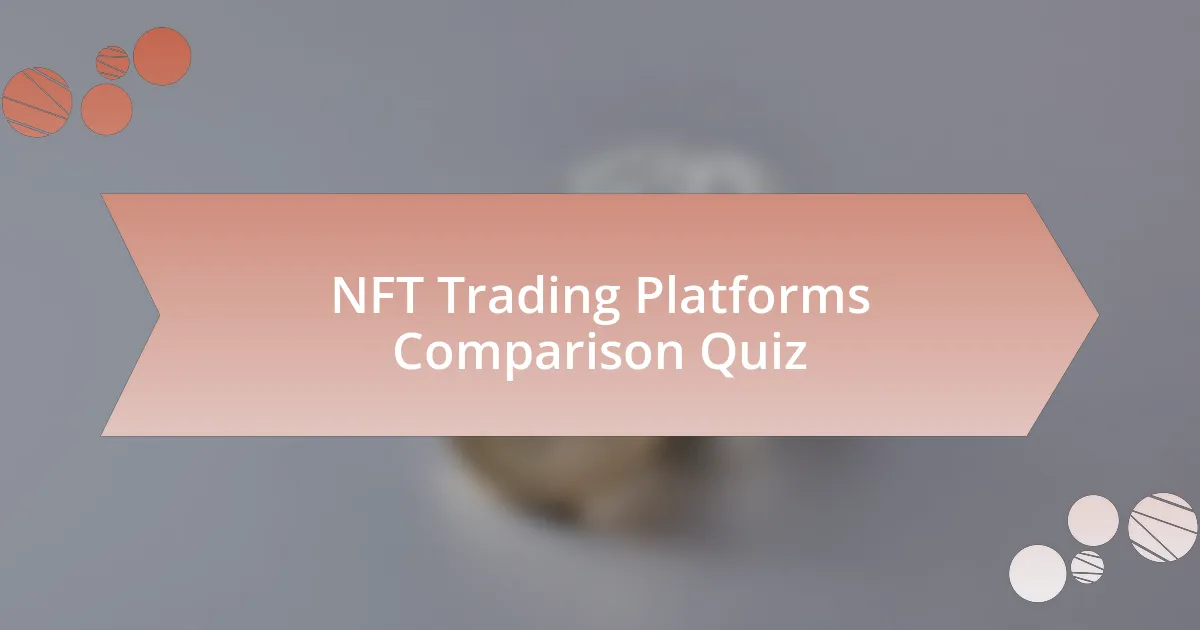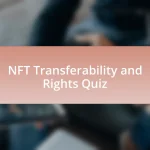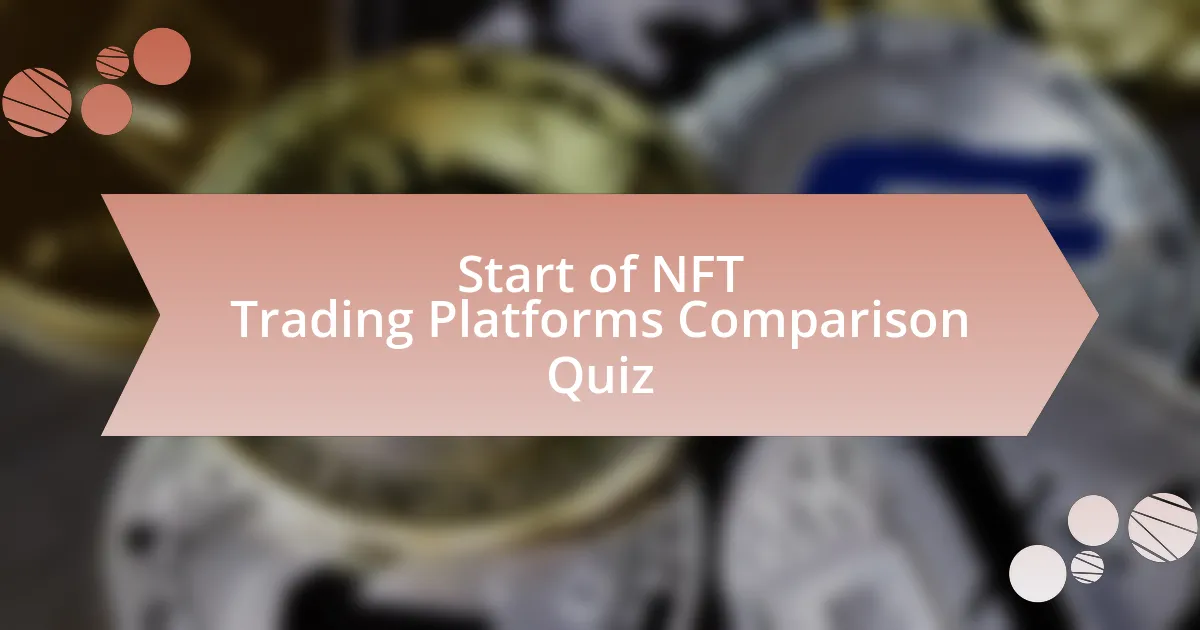
Start of NFT Trading Platforms Comparison Quiz
1. What is the primary function of OpenSea?
- OpenSea is a gaming platform for competitive online play.
- OpenSea is a social media platform for artists to showcase their work.
- OpenSea is an NFT marketplace where users can create, acquire, and trade a wide range of NFTs.
- OpenSea is a stock trading app for buying and selling shares.
2. How many blockchain networks does OpenSea support?
- Six
- Ten
- Four
- Two
3. What is the transaction fee charged by OpenSea?
- OpenSea charges a 2.5% transaction fee on all sales.
- OpenSea charges a 1% transaction fee on all sales.
- OpenSea charges a 3% transaction fee on all sales.
- OpenSea charges a 5% transaction fee on all sales.
4. Which other marketplaces support cross-blockchain transactions?
- Alibaba
- Amazon
- Rarible
- eBay
5. What is the primary focus of Rarible?
- Rarible is a gaming platform that enables users to play and win cryptocurrency.
- Rarible is an online store for purchasing physical art pieces.
- Rarible is a social media platform for sharing digital artwork.
- Rarible is a creator-focused platform that allows users to create, sell, and collect various digital items secured on the blockchain.
6. What is the cost of using Rarible?
- Rarible charges a 3% per sale fee.
- Rarible charges a 1% per sale fee.
- Rarible charges a 4% per sale fee.
- Rarible charges a 2.5% per sale fee.
7. Which marketplaces support the Ethereum blockchain?
- Netflix, Hulu, Disney+, and HBO support the Ethereum blockchain.
- OpenSea, Rarible, FTX NFT Marketplace, and CryptoPunks support the Ethereum blockchain.
- Amazon, eBay, Alibaba, and Flipkart support the Ethereum blockchain.
- Facebook, Twitter, Instagram, and Snapchat support the Ethereum blockchain.
8. What is the unique feature of GameStop NFT Marketplace?
- GameStop NFT Marketplace offers live chat support for users.
- GameStop NFT Marketplace exclusively features game-related NFTs.
- GameStop NFT Marketplace allows NFT staking for rewards.
- GameStop NFT Marketplace supports multiple wallets for user access.
9. What is the transaction fee for GameStop NFT Marketplace?
- 2.25%
- 2.75%
- 1.50%
- 3.00%
10. Which marketplaces support the Solana blockchain?
- Bitstamp
- Coinbase
- Kraken
- Rarible
11. What is the primary focus of FTX NFT Marketplace?
- FTX NFT Marketplace allows users to purchase, sell, and mint NFTs between the Ethereum and Solana blockchains.
- FTX NFT Marketplace is focused on creating and trading traditional stocks.
- FTX NFT Marketplace specializes in offering financing for cryptocurrency projects.
- FTX NFT Marketplace is designed for physical art exhibitions only.
12. What is the cost of using FTX NFT Marketplace for FTX International?
- FTX International charges a 2% fee on each exchange.
- FTX International charges a 3% fee on each sale.
- FTX International charges a 5% fee on each sell or exchange.
- FTX International charges a 1% fee on each transaction.
13. What is the cost of using FTX NFT Marketplace for FTX US?
- FTX US charges a 1.5% commission on each sale or exchange.
- FTX US charges a 2% commission on each sale or exchange.
- FTX US charges a flat fee of $10 per transaction.
- FTX US charges a 5% commission on each sale or exchange.
14. Which marketplaces offer live online training to their users?
- Sotheby`s
- CryptoPunks
- UniSat
- Nifty Gateway
15. What is the unique feature of Nifty Gateway?
- Nifty Gateway allows unlimited minting of NFTs by anyone.
- Nifty Gateway is known for its emphasis on high-quality, limited-edition NFTs.
- Nifty Gateway specializes in free NFT distributions to all users.
- Nifty Gateway is primarily a blockchain development platform.
16. Which marketplaces support multiple layer 2 scaling solutions?
- LooksRare
- Magic Eden
- UniSat
- OpenSea
17. What is the primary focus of Mintable?
- Mintable specializes in traditional stock trading and investments.
- Mintable focuses on creating physical art installations for museums.
- Mintable is dedicated to developing video games for consoles.
- Mintable is geared towards individuals looking to trade digital items and earn cryptocurrency.
18. Which marketplaces have high liquidity?
- Opensea
- Magic Eden
- Rarible
- CryptoPunks
19. What is the unique feature of LooksRare?
- LooksRare does not allow users to trade NFTs.
- LooksRare is a community-governed Ethereum NFT marketplace with native token rewards.
- LooksRare is primarily an auction house for physical art.
- LooksRare only supports Bitcoin NFTs.
20. Which marketplaces feature Bitcoin ordinal collections?
- OpenSea
- UniSat
- Rarible
- Magic Eden
21. What is the primary focus of CryptoPunks?
- CryptoPunks is a website for trading cryptocurrencies.
- CryptoPunks is a social media app for connecting artists.
- CryptoPunks is a gaming platform for virtual reality experiences.
- CryptoPunks is an iconic collection of unique NFTs on Ethereum.
22. Which marketplaces support the Binance’s BNB Chain?
- UniSat
- Rarible
- OpenSea
- Nifty Gateway
23. What is the unique feature of OKX NFT Marketplace?
- OKX NFT Marketplace is solely for trading physical art pieces.
- OKX NFT Marketplace offers exclusive virtual reality experiences.
- OKX NFT Marketplace is an OpenSea-like NFT marketplace developed by OKX.
- OKX NFT Marketplace supports only one cryptocurrency.
24. Which marketplaces have a user-friendly experience?
- Sotheby’s
- OpenSea
- FTX NFT Marketplace
- CryptoPunks
25. What is the primary focus of Sotheby’s?
- Sotheby’s is an auction house featuring Bitcoin ordinal collections.
- Sotheby’s is a social media platform for art enthusiasts.
- Sotheby’s is primarily a cryptocurrency trading platform.
- Sotheby’s is a digital art gallery showcasing contemporary artists.
26. Which marketplaces support the Avalanche blockchain?
- Nifty Gateway
- Magic Eden
- OpenSea
- Rarible
27. What is the unique feature of Base?
- Base does not allow any trades.
- Base operates in a vacuum.
- Base is supported by OpenSea.
- Base only supports Bitcoin.
28. Which marketplaces support the Klaytn blockchain?
- OpenSea
- Magic Eden
- FTX NFT Marketplace
- Rarible
29. Which marketplaces have a modern look?
- Rarible
- LooksRare
- FTX NFT Marketplace
- CryptoPunks
30. What is the waiting time for minting an NFT on FTX?
- Minting an NFT on FTX requires a 12-hour waiting time.
- Minting an NFT on FTX requires a 72-hour waiting time.
- Minting an NFT on FTX requires a 24-hour waiting time.
- Minting an NFT on FTX requires a 48-hour waiting time.
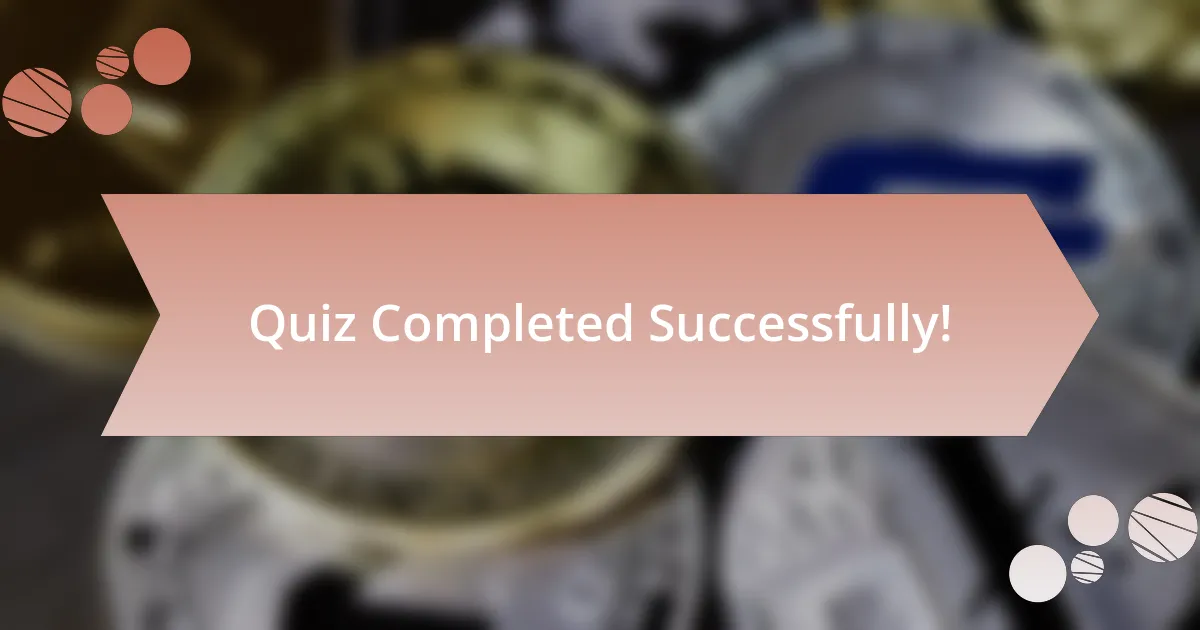
Quiz Completed Successfully!
Congratulations on finishing the quiz about NFT Trading Platforms Comparison! We hope you found the questions engaging and insightful. It’s clear that you’ve explored key aspects of various platforms, including their features, fees, and user experiences. This knowledge is essential as you navigate the evolving world of NFTs.
Through this quiz, you may have learned about the differences between popular trading platforms. Understanding these nuances can help you make informed decisions in your NFT trading journey. From transaction costs to ease of use, every detail matters. Such insights can greatly enhance your trading experience.
We encourage you to dive deeper into the subject by checking the next section on this page. It offers comprehensive information about various NFT trading platforms. This will further expand your understanding and keep you updated on the best practices in the NFT space. Happy learning!
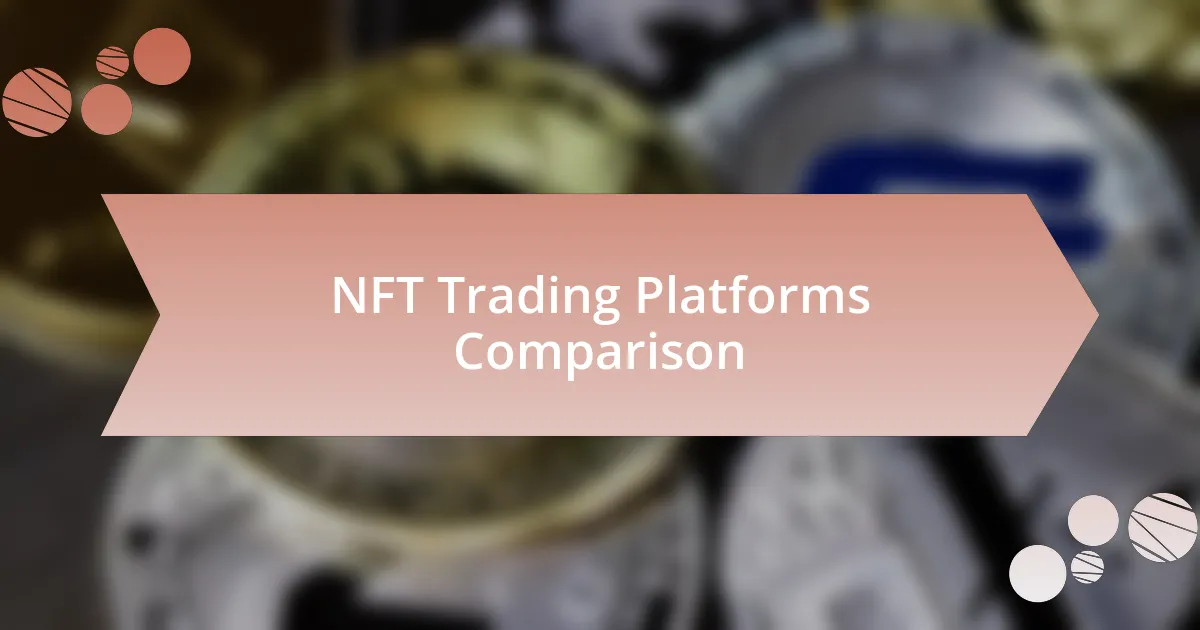
NFT Trading Platforms Comparison
Introduction to NFT Trading Platforms
NFT trading platforms are online marketplaces where users can buy, sell, and trade non-fungible tokens (NFTs). These platforms facilitate transactions by providing a user-friendly interface, wallet integration, and various digital collectibles. Examples include OpenSea and Rarible, which have gained popularity for their diverse range of NFTs and robust user communities.
Key Features of NFT Trading Platforms
Key features of NFT trading platforms include user authentication, bid and auction systems, listing and minting options, and social interaction capabilities. Some platforms also offer features like royalties for creators on secondary sales, thereby incentivizing artists. Enhancements in security protocols, such as two-factor authentication and blockchain verification, ensure safer transactions, fostering trust among users.
Popular NFT Trading Platforms Comparison
Popular NFT trading platforms like OpenSea, Rarible, and Foundation differ in terms of fees, user experience, and supported blockchain networks. OpenSea charges a 2.5% transaction fee and supports Ethereum and Polygon networks. Rarible allows for user-created governance through its RARI token and also imposes a similar fee. Each platform offers unique advantages, catering to different user needs and preferences.
User Experience and Interface of NFT Trading Platforms
User experience and interface vary significantly across NFT trading platforms. OpenSea provides a straightforward layout with easy navigation, appealing to newcomers. In contrast, platforms like Nifty Gateway incorporate curated drops and exclusive releases, creating a unique buying experience. The design and functionality impact user engagement and satisfaction rates significantly.
Security Measures in NFT Trading Platforms
Security measures in NFT trading platforms are crucial due to the high value of digital collectibles. Most platforms implement blockchain technology to ensure transparency and confirm ownership. Additionally, reputable platforms employ strong encryption methods and regular security audits. This commitment to security helps prevent fraud and protects users’ investments, enhancing overall confidence in the trading environment.
What are the main features of NFT trading platforms?
NFT trading platforms primarily offer features such as user-friendly interfaces, wallet integration, marketplace listings, auction systems, and community engagement tools. These features allow users to easily create, buy, sell, and trade NFTs. For instance, platforms like OpenSea and Rarible support multiple blockchain networks, enhancing accessibility for users looking to mint or acquire NFTs.
How do NFT trading platforms determine transaction fees?
NFT trading platforms typically determine transaction fees based on a percentage of the sale price. This can vary between platforms. For example, OpenSea charges a 2.5% fee on each transaction, while other platforms might have fixed fees or varying rates based on user activity. Such fee structures are designed to sustain platform operations and incentivize usage.
Where can users find reputable NFT trading platforms?
Users can find reputable NFT trading platforms through online reviews, forums, and social media. Websites like CoinMarketCap and CryptoSlate often list and compare various NFT platforms based on user ratings and functionalities. Additionally, community feedback on forums like Reddit can provide insight into the most trusted platforms.
When did NFT trading platforms gain significant popularity?
NFT trading platforms gained significant popularity in early 2021, driven by high-profile sales and celebrity endorsements. For example, the sale of Beeple’s digital artwork for $69 million at Christie’s auction marked a turning point, attracting widespread media attention and driving user interest in NFT marketplaces.
Who are the leading NFT trading platforms in the market?
The leading NFT trading platforms include OpenSea, Rarible, and Foundation. OpenSea, for instance, is one of the largest NFT marketplaces by volume, allowing users to trade a wide range of digital assets. Rarible includes community governance features, enabling users to participate in decision-making through its RARI token, which enhances its appeal among creators and collectors.

